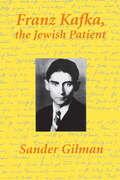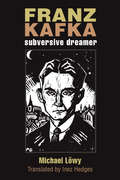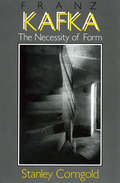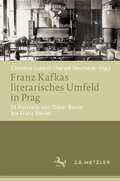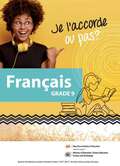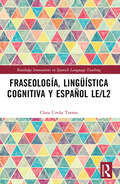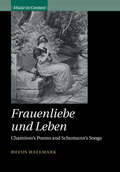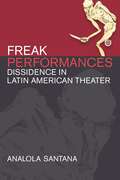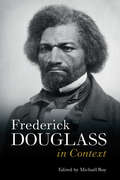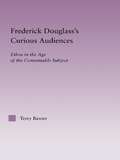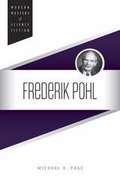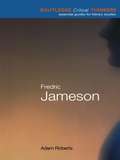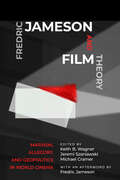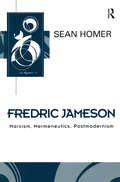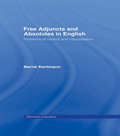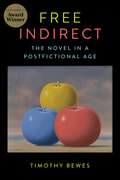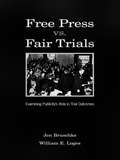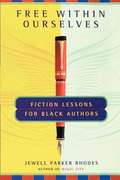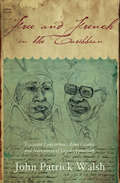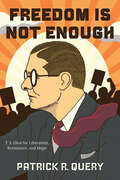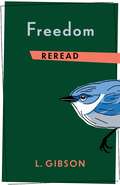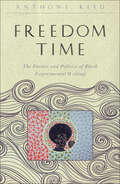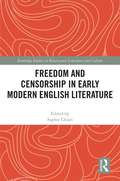- Table View
- List View
Franz Kafka, The Jewish Patient
by Sander GilmanThis is the first book about Kafka that uses the writer's medical records. Gillman explores the relation of the body to cultural myths, and brings a unique and fascinating perspective to Kafka's life and writings.
Franz Kafka: Subversive Dreamer
by Michael Lowy Inez HedgesFranz Kafka: Subversive Dreamer is an attempt to identify and properly contextualize the social critique in Kafka's biography and work that links father-son antagonisms, heterodox Jewish religious thinking, and anti-authoritarian or anarchist protest against the rising power of bureaucratic modernity. The book proceeds chronologically, starting with biographical facts often neglected or denied relating to Kafka's relations with the Anarchist circles in Prague, followed by an analysis of the three great unfinished novels--Amerika, The Trial, The Castle--as well as some of his most important short stories. Fragments, parables, correspondence, and his diaries are also used in order to better understand the major literary works. Löwy's book grapples with the critical and subversive dimension of Kafka's writings, which is often hidden or masked by the fabulistic character of the work. Löwy's reading has already generated controversy because of its distance from the usual canon of literary criticism about the Prague writer, but the book has been well received in its original French edition and has been translated into Spanish, Italian, Portuguese, Greek, and Turkish.
Franz Kafka: The Necessity of Form
by Stanley CorngoldIn Stanley Corngold’s view, the themes and strategies of Kafka’s fiction are generated by a tension between his concern for writing and his growing sense of its arbitrary character. Analyzing Kafka’s work in light of "the necessity of form," which is also a merely formal necessity, Corngold uncovers the fundamental paradox of Kafka’s art and life. The first section of the book shows how Kafka’s rhetoric may be understood as the daring project of a man compelled to live his life as literature. In the central part of the book, Corngold reflects on the place of Kafka within the modern tradition, discussing such influential precursors of Cervantes, Flaubert, and Nietzsche, whose works display a comparable narrative disruption. Kafka’s distinctive narrative strategies, Corngold points out, demand interpretation at the same time they resist it. Critics of Kafka, he says, must be aware that their approaches are guided by the principles that Kafka’s fiction identifies, dramatizes, and rejects.
Franz Kafkas literarisches Umfeld in Prag: 14 Portraits von Oskar Baum bis Franz Werfel
by Christine Lubkoll Harald NeumeyerFranz Kafka pflegte zu Lebzeiten intensive gesellige und intellektuelle Kontakte, die teils mit bekannten Namen verbunden, teils nahezu vergessen sind. Der Band nimmt die vielfältigen Austauschprozesse des Prager Umfelds in den Blick. Er portraitiert Schriftstellerinnen und Schriftsteller, die mit Kafka kommunizierten, und fragt: Welche inhaltlichen Schwerpunkte, ästhetischen Reflexionen oder auch gesellschaftspolitischen Einschätzungen verbinden sie? Welche Auswirkungen hat der gemeinsame Horizont auf ihre Schreibpraxis und ihre Werke? Welches Gesamtbild der literarhistorischen Konstellation zwischen 1910 und 1920 entsteht, wenn man die komplexen Querverbindungen nachzeichnet?Die Beiträge konzentrieren sich auf die biographischen Vernetzungen der Autor*innen mit Kafka, auf Werke, die diese zu Kafkas Lebzeiten verfasst haben sowie auf ihre Einbettung in die Literaturkultur ihrer Zeit. Im Fokus stehen Oskar Baum, Karl Brand, Max Brod, Ernst Feigl, Milena Jesenská, Paul Kornfeld, Alfred Kubin, Jizchak Löwy, Otto Pick, Miriam Singer, Johannes Urzidil, Melchior Vischer, Ernst Weiß und Franz Werfel.
Français class 9 - MIE
by Mauritius Institute of EducationLe manuel de français de 9e année, élaboré par l'Institut d'Éducation de Maurice en 2021, est une ressource complète conçue pour améliorer la maîtrise de la langue en accord avec le Cadre National du Curriculum. Les contributeurs, dont le Professeur Vassen Naëck et le Dr. Vèle Putchay, ont élaboré une approche pédagogique qui s'appuie sur les compétences fondamentales acquises en 7e et 8e année. Le manuel met l'accent sur le développement des compétences linguistiques et de communication essentielles pour une expression et une compréhension efficaces. À travers des unités dédiées à la correspondance écrite, aux textes argumentatifs et au reportage, les élèves sont guidés à travers des exercices qui favorisent un apprentissage progressif et une préparation à l'examen national de 9e année. Avec son programme structuré et son contenu captivant, le manuel constitue un outil précieux pour les élèves désireux de maîtriser la langue française et d'exceller dans leurs études.
Fraseología, lingüística cognitiva y español LE/L2 (Routledge Innovations in Spanish Language Teaching)
by Clara Ureña TormoFraseología, lingüística cognitiva y español LE/L2 es la primera obra que ofrece una introducción teórica a la fraseología del español desde la perspectiva cognitiva y que proporciona unas bases metodológicas para su enseñanza en el aula. Este libro se apoya en una investigación original galardonada con el Premio ASELE-Routledge 2020. Sus principales características son: presentación de los contenidos en un recorrido que va de lo teórico a lo aplicado y experimental; explicaciones con abundantes ejemplos de unidades fraseológicas en contextos reales de uso; orientaciones metodológicas y estrategias didácticas de corte cognitivo para una aplicación directa en el aula; actividades para enseñar y aprender fraseologismos idiomáticos del español acompañadas de soluciones; estudio empírico sobre una propuesta didáctica de base cognitiva para la adquisición de un conjunto de locuciones del español; glosario bilingüe español-inglés de términos clave de la fraseología y la lingüística cognitiva para acercar estos dos ámbitos hasta los docentes. Lingüistas, fraseólogos, profesores de español y estudiantes de Lingüística y Estudios hispánicos encontrarán en este libro las claves de las principales aportaciones de la lingüística cognitiva al estudio de la fraseología en su vertiente teórica y aplicada a la enseñanza-aprendizaje de las unidades fraseológicas. Fraseología, lingüística cognitiva y español LE/L2 is the first work to offer a theoretical introduction to Spanish phraseology from a cognitive perspective and to provide a methodological basis for its teaching in the classroom. This volume is based on original research awarded the ASELE-Routledge Book Prize 2020. Its main features are: presentation of the contents in a path from the theoretical to the applied and experimental; explanations with abundant examples of phraseological units in real contexts of use; methodological orientations and didactic strategies of a cognitive nature for direct application in the classroom; activities for teaching and learning Spanish idiomatic phraseological idioms accompanied by answer key; empirical study of a cognitive-based didactic proposal for the acquisition of a set of Spanish idioms; a bilingual Spanish-English glossary of key terms in phraseology and cognitive linguistics to bring these two fields closer to teachers. Linguists, phraseologists, teachers of Spanish and students of Linguistics and Hispanic studies will find in this book the keys to the main contributions of cognitive linguistics to the study of phraseology in its theoretical and applied aspects to the teaching-learning of phraseological units.
Frauenliebe und Leben: Chamisso's Poems And Schumann's Songs (Music In Context Ser.)
by Rufus HallmarkRufus Hallmark's book explores Robert Schumann's beloved yet controversial song cycle Frauenliebe und Leben and the poems of Adelbert von Chamisso on which it is based, setting them in the context of the challenges and social expectations faced by women in early nineteenth-century Germany. Hallmark provides the most extensive English-language study of Chamisso, a poet little known today outside Germany, including a biographical sketch and excerpts from his other poetry. He examines a range of poems about women, by Chamisso and others, and discusses the reception of the poetic and musical cycles, including illustrated editions, contemporary reviews, and other musical settings. Based on new studies of Schumann's manuscript sources and on comparative analyses of his songs and settings by Carl Loewe, Heinrich Marschner, Franz Lachner and others, Hallmark provides fresh musical and interpretive insights into each song.
Freak Performances: Dissidence in Latin American Theater
by Analola SantanaThe figure of the freak as perceived by the Western gaze has always been a part of the Latin American imaginary, from the letters that Columbus wrote about his encounters with dog-faced people to Shakespeare's Caliban. The freak acquires greater significance in a globalized, neoliberal world that defines the "abnormal" as one who does not conform mentally, physically, or emotionally and is unable or unwilling to follow the economic and cultural norms of the institutions in power. Freak Performances examines the continuing effects of colonialism on modern Latin American identities, with a particular focus on the way it has constructed the body of the other through performance. Theater questions the representations of these bodies, as it enables the empowerment of the silenced other; the freak as a spectacle of otherness finds in performance an opportunity for re-appropriation by artists resisting the dominant authority. Through an analysis of experimental theater, dance theater, performance art, and gallery-based installation art across eight countries, Analola Santana explores the theoretical issues shaped by the encounters and negotiations between different bodies in the current Latin American landscape.
Frederick Douglass in Context (Literature in Context)
by Michaël RoyFrederick Douglass in Context provides an in-depth introduction to the multifaceted life and times of Frederick Douglass, the nineteenth-century's leading black activist and one of the most celebrated American writers. An international team of scholars sheds new light on the environments and communities that shaped Douglass's career. The book challenges the myth of Douglass as a heroic individualist who towered over family, friends, and colleagues, and reveals instead a man who relied on others and drew strength from a variety of personal and professional relations and networks. This volume offers both a comprehensive representation of Douglass and a series of concentrated studies of specific aspects of his work. It will be a key resource for students, scholars, teachers, and general readers interested in Douglass and his tireless fight for freedom, justice, and equality for all.
Frederick Douglass's Curious Audiences: Ethos in the Age of the Consumable Subject (Studies in Major Literary Authors #35)
by Terry BaxterThis book attempts to answer a fundamental question: How did Douglass manage to persuade anyone about the evils of slavery, and even impress viewers with his personal qualities, when his speeches were commonly considered mere entertainment, in the same category as Barnum's circus acts? In answering this question, Terry Baxter provides a means of understanding the positive responses of Frederick Douglass's white audiences and African American celebrities' roles as both objects of consumption and vehicles for social change.
Frederik Pohl
by Michael R PageOne of science fiction's undisputed grandmasters, Frederik Pohl built an astonishing career that spanned more than seven decades. Along the way he won millions of readers and seemingly as many awards while producing novels, short stories, and essays that left a profound mark on the genre. In this first-of-its-kind study, Michael R. Page traces Pohl's journey as an author but also uncovers his role as a transformative figure who shaped the genre as a literary agent, book editor, and in Gardner Dozois' words, "quite probably the best SF magazine editor who ever lived."
Fredric Jameson (Routledge Critical Thinkers)
by Adam RobertsAn invaluable introduction to the life and work of one of today's most important cultural critics. Studied on most undergraduate literary and cultural studies courses, Fredric Jameson's writing targets subjects from architecture to science fiction, cinema to global capitalism. Of his works, The Political Unconscious remains one of the most widely cited Marxist literary-theoretical texts, and 'Postmodernism, or the cultural logic of late capitalism', is amongst the most influential statements on the nature of post-modernity ever published. Adam Roberts offers an `ngaging introduction to this crucial figure, which will convince any student of contemporary theory that Jameson must be read.
Fredric Jameson and Film Theory: Marxism, Allegory, and Geopolitics in World Cinema
by John Mackay Dudley Andrew Jeremi Szaniawski Fredric Jameson Pansy Duncan Michael Cramer Paul Coates Dan Hassler-Forest Naoki Yamamoto Mike Wayne Keith B. Wagner Alvin K. Wong Mercedes VazquezFrederic Jameson and Film Theory is the first collection of its kind, it assesses and critically responds to Fredric Jameson’s remarkable contribution to film theory. The essays assembled explore key Jamesonian concepts—such as totality, national allegory, geopolitics, globalization, representation, and pastiche—and his historical schema of realism, modernism, and postmodernism, considering, in both cases, how these can be applied, revised, expanded and challenged within film studies. Featuring essays by leading and emerging voices in the field, the volume probes the contours and complexities of neoliberal capitalism across the globe and explores world cinema's situation within these forces by deploying and adapting Jamesonian concepts, and placing them in dialogue with other theoretical paradigms. The result is an innovative and rigorously analytical effort that offers a range of Marxist-inspired approaches towards cinemas from Asia, Latin America, Europe, and North America in the spirit of Jameson's famous rallying cry: 'always historicize!'.
Fredric Jameson: Marxism, Hermeneutics, Postmodernism (Key Contemporary Thinkers Ser.)
by Sean HomerFredric Jameson has been described as "probably the most important cultural critic writing in English today" and he is widely acknowledged as the foremost proponent for the tradition of critical theory known as Western Marxism.Yet his work has not been given the systematic review like other contemporary thinkers like Fooucault and Derrida. Fredric Jameson: Marxism, Hermeneutics, Postmodernism is a thoroughly up-to-date, detailed review and analysis of the work of this influential intellectual. Covering Jameson's work and thought from his early projects of form and history to his more recent engagements with postmodernism and cultural politics, this synthesis offers a balanced assessment of his ideas, their development and their continuing influence.
Free Adjuncts and Absolutes in English: Problems of Control and Interpretation (Germanic Linguistics)
by Bernd KortmannFree adjuncts and absolutes typically function as adverbial clauses which are not overtly specified for any particular adverbial relation. The book is a non-formal, corpus based study of their current use in English. Its particular focus is on a comprehensive and in-depth analysis of their semantic indeterminacy and the syntactic, semantic, and pragmatic factors that help resolve it.
Free Indirect: The Novel in a Postfictional Age (Literature Now)
by Timothy BewesEverywhere today, we are urged to “connect.” Literary critics celebrate a new “honesty” in contemporary fiction or call for a return to “realism.” Yet such rhetoric is strikingly reminiscent of earlier theorizations. Two of the most famous injunctions of twentieth-century writing—E. M. Forster’s “Only connect . . .” and Fredric Jameson’s “Always historicize!”—helped establish connection as the purpose of the novel and its reconstruction as the task of criticism. But what if connection was not the novel’s modus operandi but the defining aesthetic ideology of our era—and its most monetizable commodity? What kind of thought is left for the novel when all ideas are acceptable as long as they can be fitted to a consumer profile?This book develops a new theory of the novel for the twenty-first century. In the works of writers such as J. M. Coetzee, Rachel Cusk, James Kelman, W. G. Sebald, and Zadie Smith, Timothy Bewes identifies a mode of thought that he calls “free indirect,” in which the novel’s refusal of prevailing ideologies can be found. It is not situated in a character or a narrator and does not take a subjective or perceptual form. Far from heralding the arrival of a new literary genre, this development represents the rediscovery of a quality that has been largely ignored by theorists: thought at the limits of form. Free Indirect contends that this self-awakening of contemporary fiction represents the most promising solution to the problem of thought today.
Free Press Vs. Fair Trials: Examining Publicity's Role in Trial Outcomes (Routledge Communication Series)
by Jon Bruschke William Earl LogesCurrent research on media and the law has generally been atheoretical and contradictory. This volume explains why pretrial publicity is unlikely to affect the outcome of most jury trials, despite many experimental studies claiming to show the influence of publicity. It reviews existing literature on the topic and includes results from the authors' own research in an effort to answer four questions: *Does pretrial publicity bias the outcome of trials? *If it has an effect, under what conditions does this effect emerge? *What remedies should courts apply in situations where pretrial publicity may have an effect? *How does pretrial publicity relate to broader questions of justice? Reporting research based on actual trial outcomes rather than on artificial laboratory studies, Free Press vs. Fair Trials examines publicity in the context of the whole judicial system and media system. After a thorough review of research into pretrial publicity, the authors argue that the criminal justice system's remedies are likely to be effective in most cases and that there are much larger obstacles confronting defendants than publicity. This book presents the first extensive study of the influence of pretrial publicity on actual criminal trials, with results that challenge years of experimental research and call for more sophisticated study of the intersection of media and criminal justice. It is required reading for scholars in media law, media effects, legal communication, criminal justice, and related areas.
Free Trade and Sailors' Rights in the War of 1812
by Paul A. GiljeOn July 2, 1812, Captain David Porter raised a banner on the USS Essex proclaiming "A free trade and sailors rights," thus creating a political slogan that explained the War of 1812. Free trade demanded the protection of American commerce, while sailors' rights insisted that the British end the impressment of seamen from American ships. Repeated for decades in Congress and in taverns, the slogan reminds us today that our second war with Great Britain was not a mistake. It was a contest for the ideals of the American Revolution bringing together both the high culture of the Enlightenment to establish a new political economy and the low culture of the common folk to assert the equality of humankind. Understanding the War of 1812 and the motto that came to explain it - free trade and sailors' rights - allows us to better comprehend the origins of the American nation.
Free Within Ourselves: Fiction Lessons for Black Authors
by Jewell Parker RhodesA top-notch writer's guide filled with practical guidance, essays, and journal exercises for the African-American writer including advice from E. Lynn Harris, Charles Johnson, and Yolanda Joe. In her introduction, Jewell Parker Rhodes writes: "Never (in four years of college or five years of graduate school) was I assigned an exercise or given a story example that included a person of color. . . While the educational system and the publishing world have become progressively more welcoming of African-American authors, there is still little attention to educating, supporting, and sustaining the writing process of African-American authors. Free Within Ourselves is a solid first step--it is the book I wished I had when I started out as a writer. It is meant to be a song of encouragement for African-American artists and visionaries. Free Within Ourselves is a step-by-step introduction to fictional technique, exploring story ideas, and charting one's progress, as well as a resource guide for publishing fiction." For the legions of people who have a novel stuck in their word processors, help is finally on the way!Free Within Ourselves is an excellent guide to all the elements necessary to crafting fiction: character development, point of view, plot, atmosphere, dialogue, diction, sentence variety, and revision. Writing techniques are taught using exercises, journaling, story examples, and analyses of famous writing fragments, as well as several complete stories (including those of James Baldwin, Zora Neale Hurston, and Edwidge Dandicat, among others). The book is further enhanced by inspirational advice from successful contemporary black writers (such as Bebe Moore Campbell, Rita Dove, Henry Louis Gates, John Edgar Wideman, and others), a bibliography, and a guide to workshops, journals, magazines, contests, and fellowships supportive of black arts.
Free and French in the Caribbean: Toussaint Louverture, Aimé Césaire, and Narratives of Loyal Opposition (Blacks in the Diaspora)
by John Patrick Walsh&“All the ingredients to become the next important book in the field of postcolonial studies with the emphasis on French Caribbean culture and literature.&”—Daniel Desormeaux, University of Chicago In Free and French in the Caribbean, John Patrick Walsh studies the writings of Toussaint Louverture and Aimé Césaire to examine how they conceived of and narrated two defining events in the decolonializing of the French Caribbean: the revolution that freed the French colony of Saint-Domingue in 1803 and the departmentalization of Martinique and other French colonies in 1946. Walsh emphasizes the connections between these events and the distinct legacies of emancipation in the narratives of revolution and nationhood passed on to successive generations. By reexamining Louverture and Césaire in light of their multilayered narratives, the book offers a deeper understanding of the historical and contemporary phenomenon of &“free and French&” in the Caribbean. &“A fruitful intervention in a growing body of literature and increasingly lively debate on the Haitian Revolution and the figure of Toussaint Louverture, the book also contributes to the emerging scholarship on Césaire, Francophone literature, and postcolonial theory.&”—Gary Wilder, CUNY Graduate Center &“A valuable contribution to both the rapidly proliferating literature on the Haitian Revolution and the emerging revisionist appreciation of Césaire&’s intellectual and political project.&”—Small Axe &“J.P. Walsh has produced for the nonspecialist reader an excellent analysis of the historiographical discourse on Toussaint Louverture and Aimé Césaire with a focus on the meaning(s) of decolonization in the late eighteenth and mid-twentieth centuries.&”—New West Indian Guide &“That Free and French inspires so many questions is testament to its ambition, the provocative parallel at its heart, and the richness of Walsh&’s analysis.&”—H-Empire
Free to Be You and Me
by Marlo ThomasComics, songs and the stories that give messages to young children why they are in this world.
Freedom Is Not Enough: T. S. Eliot for Liberation, Resistance, and Hope
by Patrick R. QueryHow does literature from the past speak to the present? What can we, as readers committed to combatting oppression, learn from figures whose writing we love but some of whose beliefs we may oppose? Quite a lot, according to Patrick R. Query. To make this case, Query turns to a writer and critic as canonical as he is controversial—T. S. Eliot. Passionately argued and eminently readable, Freedom Is Not Enough shows how Eliot makes a surprising yet vital ally in the struggle to fill the world with more freedom, equality, and human dignity. Without ignoring or downplaying the bigotry and elitism that are ineluctable parts of Eliot's legacy, Query argues that we need today what Eliot has to teach us: about migration, peace, friendship, radicalism, anti-fascism, liberation, resistance, and hope. Drawing on the full scope of Eliot's oeuvre—from his most well-known poetry and prose to newly available archival materials—Freedom Is Not Enough demonstrates how to use Eliot and literature more broadly to confront the forces conspiring to turn our world into a waste land.
Freedom Reread (Rereadings)
by L. GibsonFew writers rankle like Jonathan Franzen. Despite popular acclaim, robust sales, and august literary laurels, Franzen’s polarizing persona shares the spotlight with—and sometimes steals it from—his tragicomic novels of Midwestern family life.In this reconsideration of Freedom (2010), L. Gibson explores the difficulty of coming to terms with Jonathan Franzen. Freedom Reread considers the author’s distinctive narrative technique in light of the contradictions for which he is renowned: widely read curmudgeon, tweeted-about luddite, self-proclaimed partisan of fiction who frequently announces the novel’s death. Bookended by autofictional forays into the process of—and resistance to—taking a definite stance on Franzen, this book places Freedom in conversation with a playful, idiosyncratic array of interlocutors, including Middlemarch and You’ve Got Mail, Amitav Ghosh on climate change and Susan Sontag on metaphor, speculative fiction and Succession.Avowedly ambivalent about Franzen, Gibson offers both a fresh appreciation of the author’s work and a searching critical analysis of his pronouncements on the novel’s fate. Wide-ranging and stylistically ambitious, Freedom Reread delivers an assured, artful inquiry into Franzen’s novelistic technique and public persona.
Freedom Time: The Poetics and Politics of Black Experimental Writing (The <I>Callaloo</I> African Diaspora Series)
by Anthony ReedExperimental poetry and prose by black writers reject traditional interpretations of social protest and identity formation to reveal radical new ways of perceiving the world.Winner, 2016 William Sanders Scarborough Prize, Modern Language AssociationStandard literary criticism tends to either ignore or downplay the unorthodox tradition of black experimental writing that emerged in the wake of protests against colonization and Jim Crow–era segregation. Histories of African American literature likewise have a hard time accounting for the distinctiveness of experimental writing, which is part of a general shift in emphasis among black writers away from appeals for social recognition or raising consciousness. In Freedom Time, Anthony Reed offers a theoretical reading of "black experimental writing" that presents the term both as a profound literary development and as a concept for analyzing how writing challenges us to rethink the relationships between race and literary techniques. Through extended analyses of works by African American and Afro-Caribbean writers—including N. H. Pritchard, Suzan-Lori Parks, NourbeSe Philip, Kamau Brathwaite, Claudia Rankine, Douglas Kearney, Harryette Mullen, and Nathaniel Mackey—Reed develops a new sense of the literary politics of formally innovative writing and the connections between literature and politics since the 1960s. Freedom Time reclaims the power of experimental black voices by arguing that readers and critics must see them as more than a mere reflection of the politics of social protest and identity formation. With an approach informed by literary, cultural, African American, and feminist studies, Reed shows how reworking literary materials and conventions liberates writers to push the limits of representation and expression.
Freedom and Censorship in Early Modern English Literature (Routledge Studies in Renaissance Literature and Culture)
by Sophie ChiariBroadening the notion of censorship, this volume explores the transformative role played by early modern censors in the fashioning of a distinct English literature in the sixteenth and seventeenth centuries. In early modern England, the Privy Council, the Bishop of London and the Archbishop of Canterbury, the Stationers’ Company, and the Master of the Revels each dealt with their own prerogatives and implemented different forms of censorship, with the result that authors penning both plays and satires had to juggle with various authorities and unequal degrees of freedom from one sector to the other. Text and press control thus did not give way to systematic intervention but to particular responses adapted to specific texts in a specific time. If the restrictions imposed by regulation practices are duly acknowledged in this edited collection, the different contributors are also keen to enhance the positive impact of censorship on early modern literature. The most difficult task consists in finding the exact moment when the balance tips in favour of creativity, and the zone where, in matters of artistic freedom, the disadvantages outweigh the benefits. This is what the twelve chapters of the volume proceed to do. Thanks to a wide variety of examples, they show that, in the Elizabethan and Jacobean eras, regulations seldom prevented writers to make themselves heard, albeit through indirect channels. By contrast, in the 1630s, the increased supremacy of the Church seemed to tip the balance the other way.
